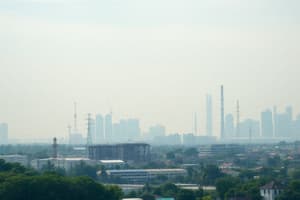Podcast
Questions and Answers
What does the repurposing of waste carbon dioxide into alternative chemical precursors and carbon-free fuels demonstrate?
What does the repurposing of waste carbon dioxide into alternative chemical precursors and carbon-free fuels demonstrate?
- The benefits of deforestation
- The importance of soil conservation
- The impact of pollution on marine life
- The intersection of environmental science and technology (correct)
Why is it important to understand the social and political drivers behind pollution according to the text?
Why is it important to understand the social and political drivers behind pollution according to the text?
- To create effective environmental policies (correct)
- To enhance the beauty of cities
- To increase industrial pollution
- To develop new fashion trends
What does research reveal about the impact of air pollution on communities according to the text?
What does research reveal about the impact of air pollution on communities according to the text?
- It has no impact on communities
- It disproportionately affects low-income communities and communities of color (correct)
- It mainly affects high-income communities
- It affects rural communities more than urban ones
What role does environmental science play in addressing pollution challenges according to the text?
What role does environmental science play in addressing pollution challenges according to the text?
Why is it important for scientists and policymakers to understand the root causes and consequences of pollution?
Why is it important for scientists and policymakers to understand the root causes and consequences of pollution?
What is one way environmental science can contribute towards protecting the planet?
What is one way environmental science can contribute towards protecting the planet?
What are the different forms of pollution mentioned in the text?
What are the different forms of pollution mentioned in the text?
Which pollutants are mentioned as causing air pollution?
Which pollutants are mentioned as causing air pollution?
What does water pollution threaten according to the text?
What does water pollution threaten according to the text?
What can cause soil pollution according to the text?
What can cause soil pollution according to the text?
How does noise pollution impact wildlife and human well-being?
How does noise pollution impact wildlife and human well-being?
What is an innovative solution mentioned in the text to combat pollution?
What is an innovative solution mentioned in the text to combat pollution?
Flashcards are hidden until you start studying
Study Notes
Understanding Pollution in Environmental Science
Environmental science is an interdisciplinary field encompassing the study of Earth's physical and biological environments, delving into environmental chemistry, biology, geology, and more. A critical aspect of this field concerns the examination and mitigation of environmental pollution, which can originate from a variety of sources.
Pollution takes many forms, including air, water, soil, and noise pollution. Air pollution, for instance, results from the release of pollutants such as greenhouse gases, particulate matter, and volatile organic compounds (VOCs) into the atmosphere. Water pollution arises when pollutants contaminate sources like rivers, lakes, and seas, threatening aquatic ecosystems and human health. Soil pollution can be caused by industrial and agricultural chemicals, heavy metals, and other contaminants. Noise pollution, while less tangible, affects wildlife and human well-being by interfering with natural behaviors and causing stress.
Modern research and technological advancements are continuously exploring innovative solutions to combat pollution. For example, metal–organic framework membranes have shown promise for their potential use in large-scale manufacturing, with the potential to filter out pollutants. Current research is also exploring the impact of climate change on pollution patterns, such as the release of methane from wetlands as sea levels rise.
One novel approach to pollution control is the repurposing of waste carbon dioxide into alternative chemical precursors and carbon-free fuels. This example demonstrates the convergence of environmental science and technology, moving beyond traditional pollution control to explore new avenues of sustainable development.
In addition to the technical aspects of pollution, understanding the social and political drivers behind pollution is integral to effective environmental policy. For example, research reveals that air pollution disproportionately impacts low-income communities and communities of color, highlighting the need for equitable solutions and policies.
As the global community continues to grapple with pollution, environmental science serves to provide the knowledge and tools necessary to analyze, understand, and address the complex challenges that arise from human interactions with the natural world. By understanding the root causes and consequences of pollution, scientists and policymakers can develop strategies that promote sustainable development and protect our planet.
Studying That Suits You
Use AI to generate personalized quizzes and flashcards to suit your learning preferences.




